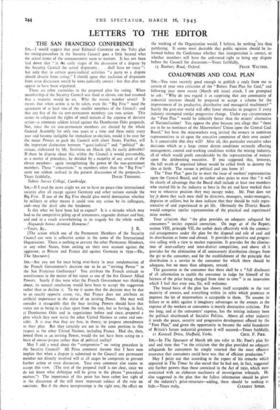SIR,—Are you not for once being over-hasty in your conflettmation
of the French Government's decision not to be an "inviting Power" to the San Francisco Conference? You attribute the French attitude to sensitiveness in the matter of her status as one of the five Greater Allied Powers. Surely if this were what the French Governthent was thinking about, its natural conclusion would have been to accept the suggestion rather than to. decline it. To me it seems that the decision may be due to an exactly opposite cause, viz., that France does not attribute an artificial importance to the status of an inviting Power. She may well consider it reasonable that the four inviting Powers should have that status not as being in a class apart from the rest, but as having, in fact, at Dumbarton Oaks and in negotiations before and since, prepared a plan which they now invite the other United Nations to come and con- sider. It is true that they are free, in theory, •to propose amendments to their plan. But they •certainly are not in the same position in this respect as the other United Nations, including France. Had she, then, joined them as an inviting Power, would she not have been acting on a basis of amour-propre rather than of political reality?
May I add a word about the "compromise" on voting procedure in the Security Council? All Press comment thereon that I have seen implies that when a dispute is submitted to the Council any permanent member not directly involved will at all stages be competent to prevent further action or even discussion. Your own comment also seems to accept this view. (The text of the proposal itself is not clear, since we do not know what definikion will be given to the phrase "procedural matters.") The importance of this point has been rather lost sight of in the discussion of the still more important subject of the veto on sanctions. But if the above interpretatir is the right one, the effect on the working of the Organisation would, I believe, be nothing less than paralysing. It seems most desirable that public opinion should be in- formed before the Conference whether that interpretation is correct, or whether members will have the unfettered right to bring any dispute before the Council for discussion.—Yours faithfully,


























 Previous page
Previous page